 Picture the scene: You and your companion have stopped at a cafe, chosen a table and drawn up your chairs. Why did you do this? In this show Lisa La Valle will explain cafe culture as part of her culture hacks for Americans.
Picture the scene: You and your companion have stopped at a cafe, chosen a table and drawn up your chairs. Why did you do this? In this show Lisa La Valle will explain cafe culture as part of her culture hacks for Americans.
Welcome to 2025 and show 302 of Absolutely Intercultural which takes a closer look at the new book by Lisa La Valle, 101 Culture Hacks for Americans living abroad (and other digital nomads): One unwritten rule at a time.
My name’s Anne Fox and this show is coming to you from Denmark. Back in 2018 we spoke to Lisa La Valle in her role as an intercultural trainer and in this show we are going to learn more about the book Lisa is writing billed as a primer for Americans venturing outside their borders. Why did she write it?
We’ll explore one or two of the hacks in the taster version of the book that is already available on Amazon. For example, did you ever think about what happens in cafes and restaurants?
And finally we’ll find out more about how much Lisa relies on the cultural frameworks which we hear so much about, such as Hofstede and the Culture Connector, compared to Lisa’s own observations on, for example, the effect of space on how loudly you speak.
absolutely hacked
So let’s go absolutely hacked and find out why Lisa, an American now living in Italy, started writing 101 Culture Hacks for Americans living abroad
absolutely café culture
Next I wanted to explore one or two of the examples from the taster version that is available right now on Amazon so let’s go absolutely cafe culture.
absolutely frameworked
Lisa La Valle has used the Culture Connector framework in her work as an intercultural facilitator so I wondered whether she’d used that or any of the other popular frameworks, many of which we have talked about on this podcast in the past, as part of her 101 Culture hacks book so let’s go absolutely frameworked.
It was very interesting to hear how Lisa makes use of the various cultural frameworks in such a pragmatic way. It sometimes seems as though these frameworks are presented as THE way to look at cultural differences, Hofstede’s dimensions, tight and loose cultures, the Four Cs and so on whereas Lisa draws on several of these frameworks as appropriate. The taster version of Lisa’s book is available on Amazon now and the full version will be coming out later this spring. What about you? Have you made some useful observations about cultural hacks relating to your own culture? We’d love to hear them.
Thanks for listening and if you have a story to tell then don’t hesitate to get in touch or leave a comment. We are also on Apple podcasts and Spotify where you can give us a rating.
Our next show will be coming to you from Laurent Borgmann in Germany on 7th February.
Until then, stay tuned!
The host of this show is: Anne Fox





 Hello dear listeners, and welcome to episode 297 of our podcast “Absolutely Intercultural.” Today, let’s dive into another cultural topic that many of you might have strong feelings about: the legalization of cannabis. Germany has partly decriminalised marijuana use as of 1 April 2024. So, have we experienced a cultural change as a result? Does legalisation mean that in the evenings, we Germans now smoke weed on our sofas in front of television instead of drinking our traditional beer? I’m afraid personally I’m a little old-school and still stick to my red wine, but then some of my friends claim that alcohol is worse than weed, so perhaps I should join one of the new Cannabis clubs?
Hello dear listeners, and welcome to episode 297 of our podcast “Absolutely Intercultural.” Today, let’s dive into another cultural topic that many of you might have strong feelings about: the legalization of cannabis. Germany has partly decriminalised marijuana use as of 1 April 2024. So, have we experienced a cultural change as a result? Does legalisation mean that in the evenings, we Germans now smoke weed on our sofas in front of television instead of drinking our traditional beer? I’m afraid personally I’m a little old-school and still stick to my red wine, but then some of my friends claim that alcohol is worse than weed, so perhaps I should join one of the new Cannabis clubs?


